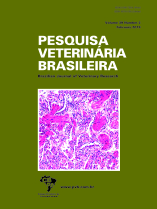 |
|
|
|
Year 2019 - Volume 39, Number 2
|

|
Antimicrobial susceptibility profile of historical and recent Brazilian pig isolates of Pasteurella multocida, 39(2):107-111
|
ABSTRACT.- Amaral A.F., Rebelatto R., Klein C.S., Takeuti K.L., Oliveira Filho J.X., Morés N., Cardoso M.R.I. & Barcellos D.E.S.N. 2019. Antimicrobial susceptibility profile of historical and recent Brazilian pig isolates of Pasteurella multocida. Pesquisa Veterinária Brasileira 39(2):107-111. Department of Population Health and Pathobiology, College of Veterinary Medicine, North Caroline State University, 1060 William Moore Drive, Raleigh, NC 27607, USA. E-mail: afamaral@ncsu.edu
Pasteurella (P.) multocida is the causative agent of pneumonic pasteurellosis in swine, which is commonly associated with the final stages of enzootic pneumonia or porcine respiratory disease complex. Although this syndrome is one of the most common and important diseases of pigs, data on antimicrobial susceptibility of P. multocida isolates are uncommon in Brazil. Therefore, the present study was carried out to determine and to compare antimicrobial susceptibility profile of Brazilian P. multocida isolated from pigs with lesions of pneumonia or pleuritis during two-time periods. Historical isolates (period of 1981 to 1997; n=44) and recent isolates (period of 2011 to 2012; n=50) were used to determine the MIC of amoxicillin, enrofloxacin, florfenicol and tetracycline by microbroth dilution. Florfenicol had the lowest level of resistance for both historical and recent isolates (0% and 6%, respectively), while tetracycline had the highest (20.5% and 34%, respectively). Multi-drug resistance (MDR) to amoxicillin/florfenicol/tetracycline was observed in 6% of recent isolates. There was a significant increase (p˂0.05) in resistance for amoxicillin and enrofloxacin in recent isolates compared with historic isolates (3.8% and 18%, respectively), most likely due to the selective pressure of antimicrobial usage to treat and prevent P. multocida infections. The results of this study showed an increase of isolates resistant to important drugs used in treatment of P. multocida infections in pigs, demonstrating the need for the implementation of rational use of antimicrobials in Brazilian swine industry. |
| |
|
|
| |
|
 |